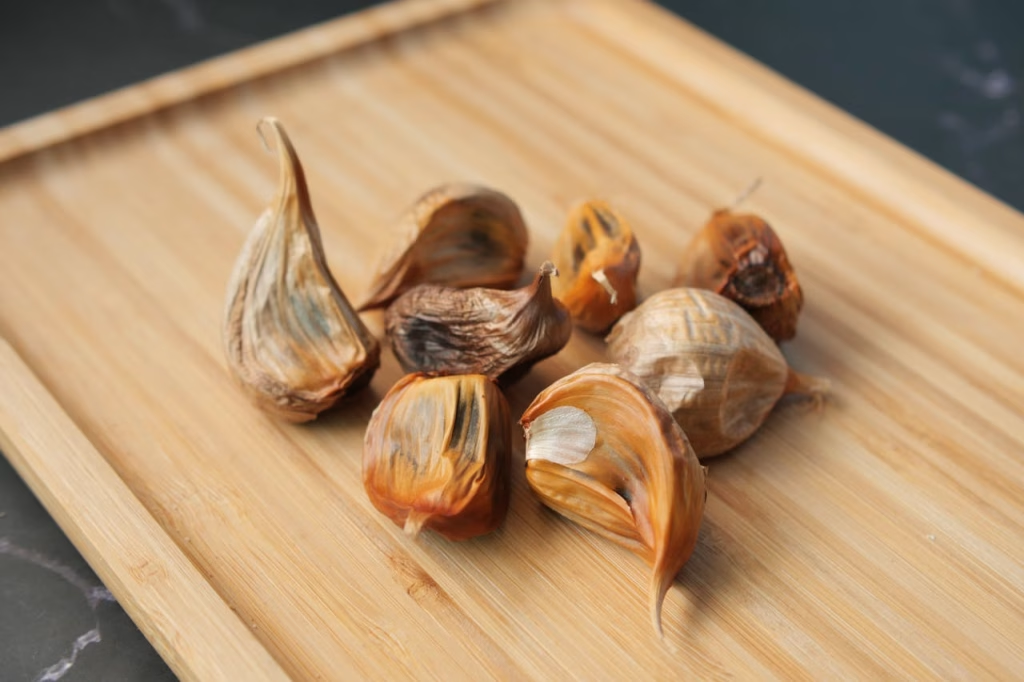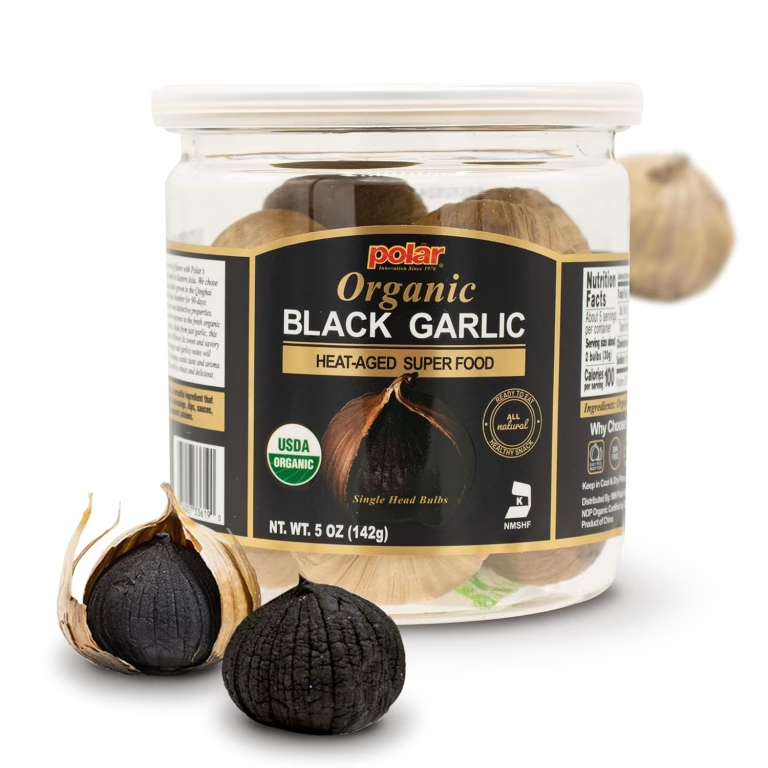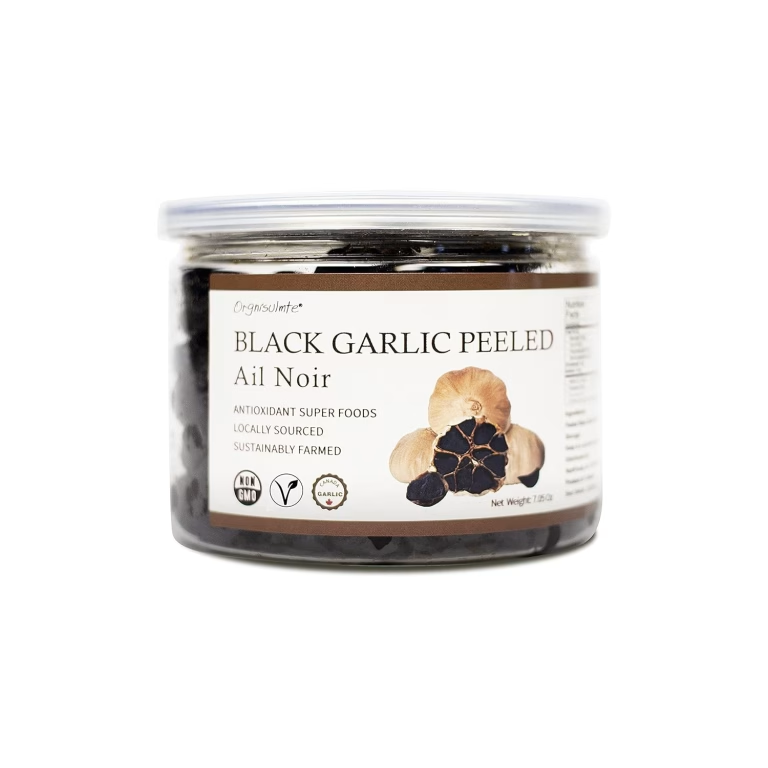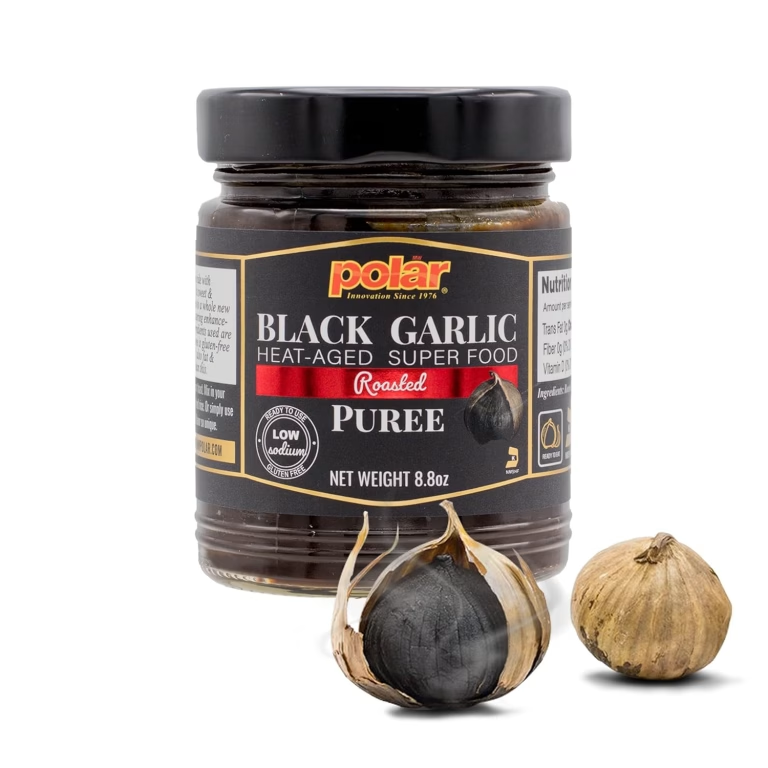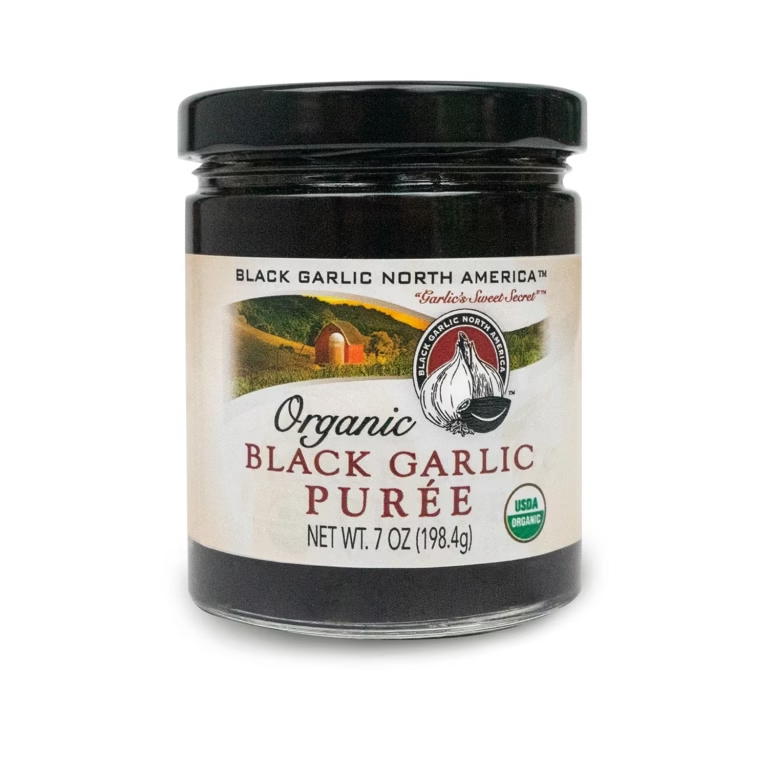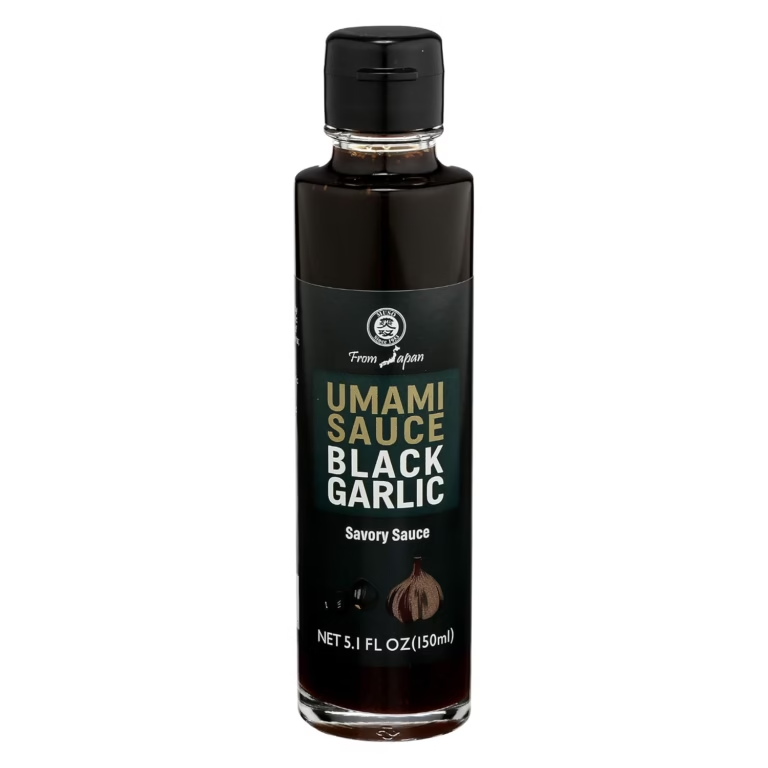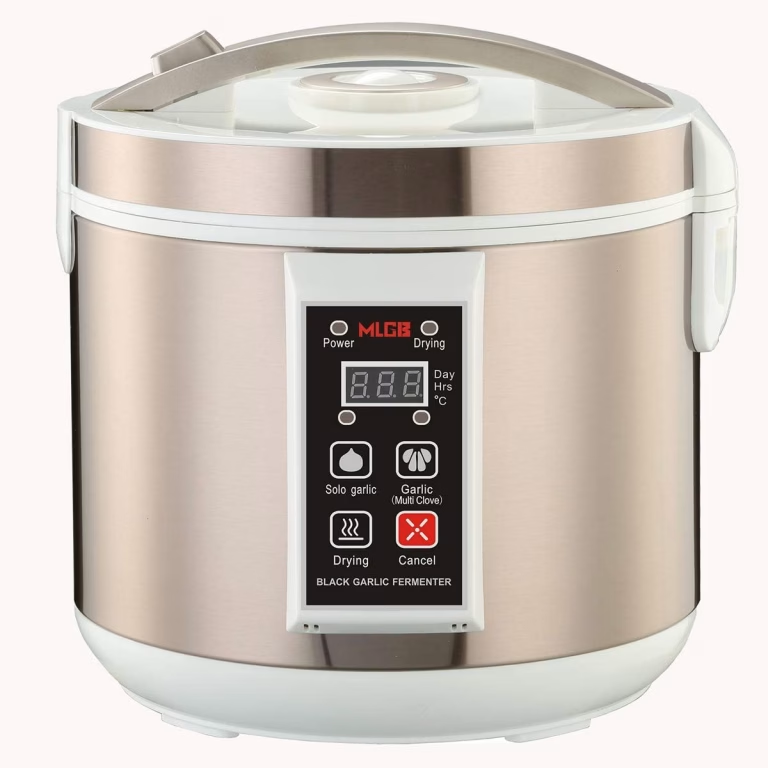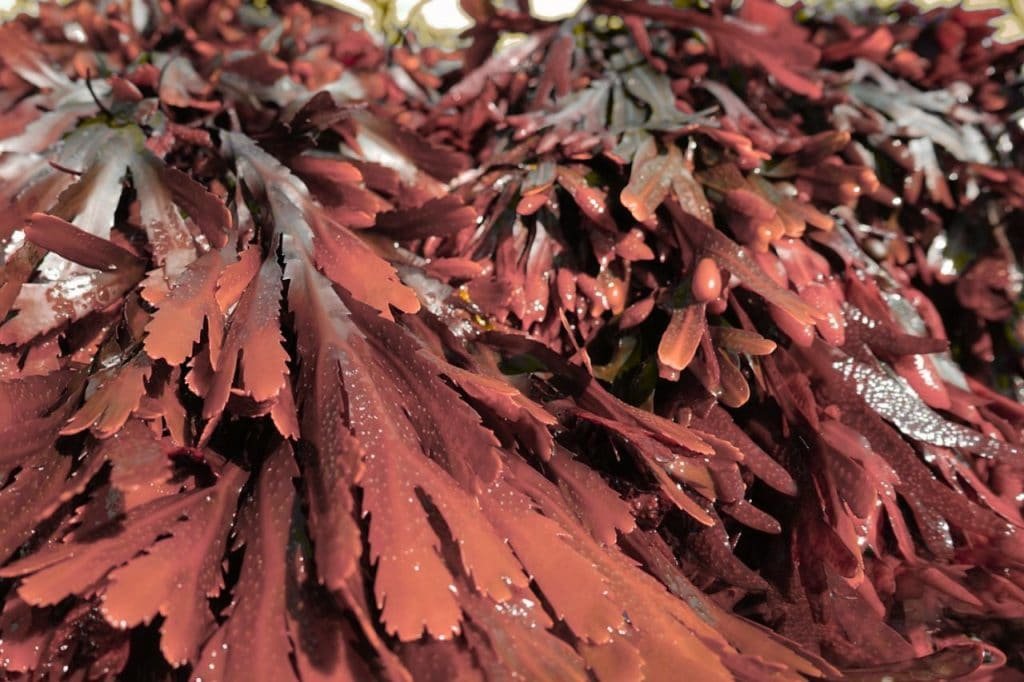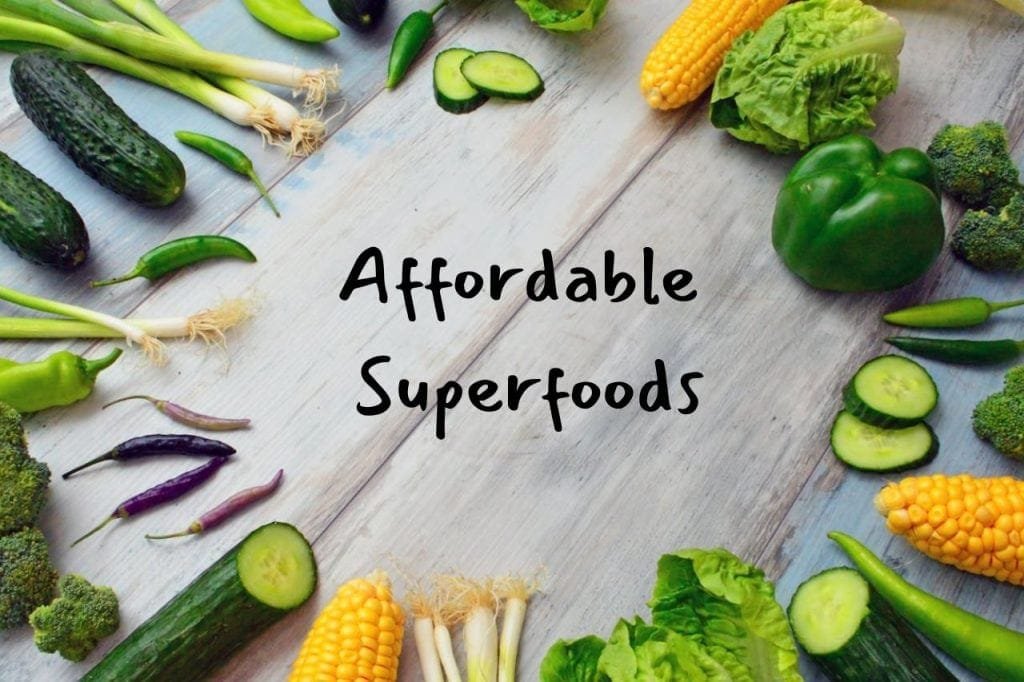I discovered black garlic while living in Spain, but it originated in South Korea in the early 2000s, spread quickly through Asia, and reached the Western world. I love its sweet and smoky taste. It is gentler on my stomach and does not cause IBS flare-ups like a clove of regular garlic. I love adding it to my homemade hummus, stews, and sauces for an umami taste or just spreading a few cloves on toasted sourdough bread.
It made me curious. Is black garlic better for you than regular garlic? How is it made, and can I make it at home? Does it have any health benefits? Should I consider taking black garlic supplements and swapping regular garlic with black garlic? Let’s research and see if there are any studies on this tasty superfood. Is it as good for our health as our tastebuds?
What is Black Garlic?
Black garlic is a type of aged garlic that is fermented at high humidity and temperatures (usually between 60–90°C or 140–194°F) over several weeks. During the fermentation, garlic’s natural enzymes break down, becoming very dark brown in colour and sweet in flavour.
What does Black Garlic Taste Like?
Black garlic cloves turn dark brown or black and have a jelly-like, soft, and chewy texture. They’re milder than regular garlic and have a sweet-savory flavor, almost like caramelized or roasted garlic, but without the strong garlicky kick or aftertaste.
How does Black garlic compare with regular garlic?
The unique ageing process that turns fresh garlic into black garlic is what makes their health benefits and compounds so different.
Black garlic is made by heating fresh garlic at a high temperature (60–90°C) with plenty of humidity for several weeks. This process creates a chemical reaction between sugars and amino acids, producing new compounds that give black garlic its dark colour, sweeter taste, and stronger antioxidant power. (1)
One significant change is in the sulfur compounds: fresh garlic has a compound called alliin, which turns into unstable allicin when chopped or crushed. In black garlic, however, alliin converts into stable, easy-to-absorb compounds like S-allyl cysteine (SAC), which help fight inflammation and boost overall health.
Although some immune-supporting compounds break down during fermentation, black garlic gains new antioxidants, protecting the heart and providing more lasting health benefits.
In short, black garlic’s ageing or fermenting process creates a more stable and powerful version of garlic with enhanced health benefits. (2)
A table highlights the differences between regular and black garlic and their compounds.
| Compound | Regular Garlic | Black Garlic |
|---|---|---|
| Allicin | High (main active compound, responsible for pungency) | Very Low (decomposes during aging process) |
| S-allyl cysteine (SAC) | Low | High (increased bioavailability and stability) |
| S-allylmercaptocysteine (SAMC) | Low | Moderate to High (increases with fermentation) |
| Polyphenols | Moderate | High (increases significantly due to aging) |
| Flavonoids | Moderate | Higher (increased antioxidant properties) |
| Antioxidants | Present (varied compounds, lower levels) | Much Higher (antioxidant levels increased) |
| Sulfur Compounds | High (mainly allicin and other volatile compounds) | Moderate (decreased due to allicin breakdown) |
| Amino Acids | Moderate | Increased (more bioavailable) |
| Fructans | Present (prebiotic effect) | Higher (transformed into simpler sugars) |
| Sugar Content | Low | High (increases due to conversion of starches) |
| pH (Acidity) | Neutral to Slightly Acidic | Lower (slightly acidic due to Maillard reaction) |
To summarise Key Differences:
- Antioxidant Properties: Due to increased polyphenols and flavonoids, black garlic has higher antioxidant potential.
- Allicin Content: Regular garlic is rich in allicin, while black garlic has virtually none as it decomposes during fermentation. (7)
- S-allyl cysteine (SAC): This stable and bioavailable compound is abundant in black garlic, enhancing its health benefits.
- Sweetness & Palatability: Black garlic’s ageing process enhances its sugar content, making it sweeter and less strong than raw garlic.
Nutrition and health benefits of Black Garlic
Studies show that black garlic is associated with various potential health benefits:
Antioxidant Properties (1)
Anti-inflammatory properties(1)
Heart Health (1)(3)
Anti-cancer Properties(1)(6)
Anti-obesity and Anti-diabetic (1)
Liver Health (1)
Neuroprotective effects (4)
Immune System Support (5)
Anti-allergic effects(1)
Although potential benefits are very exciting, we must remember that black garlic goes through an ageing or fermentation process that needs to be monitored and can vary from brand to brand. This can impact the potency and amount of beneficial compounds in black garlic. Like with any food or supplement, research the brand, quality of ingredients, and third-party testing.
How much Black Garlic can you eat each day? And can Black Garlic be dangerous?
Most of us can eat 1 to 3 cloves (around 5 to 10 grams) of black garlic daily. It is safe and provides a good dose of antioxidants. Although Black garlic is less potent than raw garlic, you should be aware of digestive discomfort and allergies. Garlic can thin the blood, so if you are on blood-thinning medication or have any bleeding disorders, you should consult a doctor before eating black garlic regularly or taking black garlic supplements.
The Best Black Garlic Products:
Many black garlic products are on the market, including whole bulbs, individual unpeeled bulbs, black garlic puree, and sprinkles. You might find black garlic in your local grocery shop; if not, you can try a few good ones.
MW Polar USDA Organic Black Garlic 5 oz (Pack of 1), Whole Bulbs
MW Polar’s Black Garlic is aged and cured with no additives or preservatives. It only contains one ingredient- garlic. While being cured in controlled heat chambers, the garlic undergoes the Maillard reaction, which transforms it completely. Through this transformation, the antioxidants of the black garlic double the antioxidants found in regular black garlic.
Orgnisulmte Canada Peeled Black Garlic Fermented for 90 Days
If you can not be asked to peel black garlic cloves, you can buy them peeled; just be ready to pay for the labour. About the Orgnisulmte Whole Black Garlic: It is seasonal, high-quality garlic, Fermented Full 90 Days, Natural, and without additives or preservatives, NON GMO.
MW Polar Black Garlic Puree
It can become expensive if you love black garlic and use it a lot. Using Black garlic puree is a good money-saving option. However, remember that most might contain other ingredients, so check the list carefully. I love this block garlic puree as it is in a glass jar, but as well as black garlic, it also contains roasted garlic and citric acid, so it might not be suitable for everyone.
Organic Black Garlic Puree
Organic Black Garlic Puree with just two ingredients – black garlic and water. Much easier to use with the same flavour profile and benefits of black garlic.
Muso From Japan – Black Garlic Umami Sauce
This souse is perfect to add to your home-cooked Ramen, marinade, or dipping souse with a beautiful umami flavor. It does contain a bit of brown sugar, but no preservatives, artificial flavors, or colors.
How to make Black Garlic?
You can make black garlic at home if you love fermenting and experimenting with food. The process requires low heat and high humidity over an extended period, which gradually ferments the garlic cloves, giving them distinct colour, flavour, and texture.
You can invest in a black garlic maker, which could also be helpful for other fermentations, including kimchi or yoghurt.
MLGB 5L Black Garlic Fermenter
There are a few black garlic fermenters on the market; I like this one as it is more multifunctional. For the best results, it is recommended to ad a bit of water at the bottom to ensure your black garlic is moist.
A surround heater enables uniform heating to ensure consistent temperature with minimal heat loss to reduce energy consumption.
Alternatively, you can make black garlic in a rice cooker, slow cooker, or dehydrator, but it would need more temperature and humidity monitoring.
Tips
Ventilation: Black garlic emits a strong smell during fermentation, so place the cooker in a well-ventilated area or outside.
Patience: The process is lengthy; it takes around 2 weeks to perfect.
Garlic Size: Use the biggest garlic bulbs for a soft texture, as small bulbs can dry out and be tricky to peel.
Cool and Store: Remove the garlic and let it cool. Black garlic can be stored in an airtight container in the fridge for several months.
Is Black garlic oil good for hair growth?
We all heard about rosemary oil for hair growth, but I have also seen some black garlic oil marketed for external use, including scalp health and hair growth. Black garlic has Antioxidant, Anti-inflammatory and Anti-microbial Properties that could support scalp health. Black garlic contains sulfur, essential for keratin production, the protein that makes up hair. However, no human studies have proven that black garlic oil could help with hair growth( unless I could not find any, please share in comments if you know of any studies of black garlic oil for hair growth), and the belief is based more on anecdotal evidence. So, if you like to rub oils in your hair or scalp, I would stick to a more pleasant smell like rosemary oil and eat the black garlic.
Want to learn more about fermented food and it’s benefits? Read : 15 Fermented Foods For Your Gut Health
To Summarise:
I have been obsessed with black garlic lately as it tastes so good in hummus and other dips and souses, so I was amazed and excited about the health benefits. It is one of my favourite superfoods lately. I will be honest: even if I use a lot of it, I do not have the patience or a properly ventilated spare room to make it at home, so I would love to hear from you if you make black garlic at home. I do want to point out that black garlic can be quite expensive, so if you love the taste of regular garlic and can digest it with no issues you do not need to replace it with black garlic.
Please Note: This post is for informational purposes only and is based on research. It’s not medical advice. It’s always best to consult a healthcare professional with health concerns. Enjoy eating black garlic.
This post contains affiliate links, and I may earn a small commission if you buy through them at no extra cost. For more details, please check out my Affiliate Disclosure.
- Ahmed, T., & Wang, C. (2021). Black Garlic and Its Bioactive Compounds on Human Health Diseases: A Review. Molecules, 26. https://doi.org/10.3390/molecules26165028.
- Ryu, J., & Kang, D. (2017). Physicochemical Properties, Biological Activity, Health Benefits, and General Limitations of Aged Black Garlic: A Review. Molecules : A Journal of Synthetic Chemistry and Natural Product Chemistry, 22. https://doi.org/10.3390/molecules22060919.
- Villaño, D., Marhuenda, J., Arcusa, R., Moreno-Rojas, J., Cerdá, B., Pereira-Caro, G., & Zafrilla, P. (2023). Effect of Black Garlic Consumption on Endothelial Function and Lipid Profile: A Before-and-After Study in Hypercholesterolemic and Non-Hypercholesterolemic Subjects. Nutrients, 15. https://doi.org/10.3390/nu15143138.
- Tran, G., Pham, T., & Trinh, N. (2019). Black Garlic and Its Therapeutic Benefits. Medicinal Plants – Use in Prevention and Treatment of Diseases. https://doi.org/10.5772/INTECHOPEN.85042.
- Nakasone, Y., Sato, N., Azuma, T., & Hasumi, K. (2016). Intake of black-vinegar-mash-garlic enhances salivary release of secretory IgA: A randomized, double-blind, placebo-controlled, parallel-group study.. Biomedical reports, 5 1, 63-67 . https://doi.org/10.3892/BR.2016.687.
- Yang, Q., Li, F., Jia, G., & Liu, R. (2023). Aged black garlic extract inhibits the growth of estrogen receptor-positive breast cancer cells by downregulating MCL-1 expression through the ROS-JNK pathway. PLOS ONE, 18. https://doi.org/10.1371/journal.pone.0286454.
- Li, M., Yan, Y., Yu, Q., Deng, Y., Wu, D., Wang, Y., Ge, Y., Li, S., & Zhao, J. (2017). Comparison of Immunomodulatory Effects of Fresh Garlic and Black Garlic Polysaccharides on RAW 264.7 Macrophages.. Journal of food science, 82 3, 765-771 . https://doi.org/10.1111/1750-3841.13589.
Silvija Meilunaite, PN1-NC, CSMC, is a certified nutrition and menopause coaching specialist who writes about midlife health, nutrition, and evidence-based wellness. She focuses on research-driven approaches to feeling better in your 40s and beyond, with a special interest in low-tox living and supportive daily habits.

